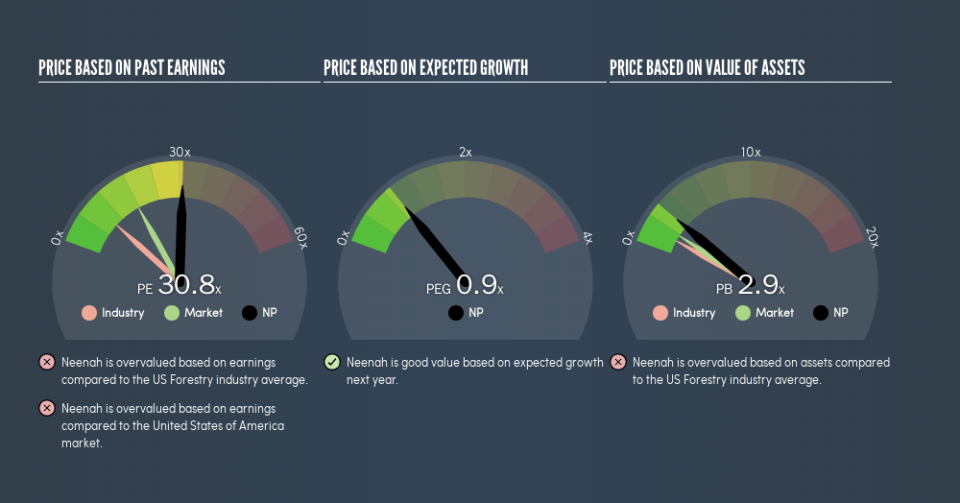Despite Its High P/E Ratio, Is Neenah, Inc. (NYSE:NP) Still Undervalued?

The goal of this article is to teach you how to use price to earnings ratios (P/E ratios). We’ll show how you can use Neenah, Inc.’s (NYSE:NP) P/E ratio to inform your assessment of the investment opportunity. Neenah has a price to earnings ratio of 30.78, based on the last twelve months. In other words, at today’s prices, investors are paying $30.78 for every $1 in prior year profit.
View our latest analysis for Neenah
How Do I Calculate A Price To Earnings Ratio?
The formula for P/E is:
Price to Earnings Ratio = Price per Share ÷ Earnings per Share (EPS)
Or for Neenah:
P/E of 30.78 = $67.58 ÷ $2.2 (Based on the year to December 2018.)
Is A High Price-to-Earnings Ratio Good?
A higher P/E ratio means that investors are paying a higher price for each $1 of company earnings. That isn’t a good or a bad thing on its own, but a high P/E means that buyers have a higher opinion of the business’s prospects, relative to stocks with a lower P/E.
How Growth Rates Impact P/E Ratios
Companies that shrink earnings per share quickly will rapidly decrease the ‘E’ in the equation. That means even if the current P/E is low, it will increase over time if the share price stays flat. So while a stock may look cheap based on past earnings, it could be expensive based on future earnings.
Neenah saw earnings per share decrease by 54% last year. And it has shrunk its earnings per share by 9.4% per year over the last three years. This growth rate might warrant a low P/E ratio. This growth rate might warrant a low P/E ratio.
How Does Neenah’s P/E Ratio Compare To Its Peers?
The P/E ratio indicates whether the market has higher or lower expectations of a company. You can see in the image below that the average P/E (9.5) for companies in the forestry industry is a lot lower than Neenah’s P/E.
Its relatively high P/E ratio indicates that Neenah shareholders think it will perform better than other companies in its industry classification. Shareholders are clearly optimistic, but the future is always uncertain. So further research is always essential. I often monitor director buying and selling.
Don’t Forget: The P/E Does Not Account For Debt or Bank Deposits
It’s important to note that the P/E ratio considers the market capitalization, not the enterprise value. Thus, the metric does not reflect cash or debt held by the company. Theoretically, a business can improve its earnings (and produce a lower P/E in the future), by taking on debt (or spending its remaining cash).
Such spending might be good or bad, overall, but the key point here is that you need to look at debt to understand the P/E ratio in context.
How Does Neenah’s Debt Impact Its P/E Ratio?
Neenah’s net debt is 20% of its market cap. That’s enough debt to impact the P/E ratio a little; so keep it in mind if you’re comparing it to companies without debt.
The Bottom Line On Neenah’s P/E Ratio
Neenah’s P/E is 30.8 which is above average (17.6) in the US market. With some debt but no EPS growth last year, the market has high expectations of future profits.
Investors should be looking to buy stocks that the market is wrong about. If the reality for a company is better than it expects, you can make money by buying and holding for the long term. So this free report on the analyst consensus forecasts could help you make a master move on this stock.
But note: Neenah may not be the best stock to buy. So take a peek at this free list of interesting companies with strong recent earnings growth (and a P/E ratio below 20).
We aim to bring you long-term focused research analysis driven by fundamental data. Note that our analysis may not factor in the latest price-sensitive company announcements or qualitative material.
If you spot an error that warrants correction, please contact the editor at editorial-team@simplywallst.com. This article by Simply Wall St is general in nature. It does not constitute a recommendation to buy or sell any stock, and does not take account of your objectives, or your financial situation. Simply Wall St has no position in the stocks mentioned. Thank you for reading.

